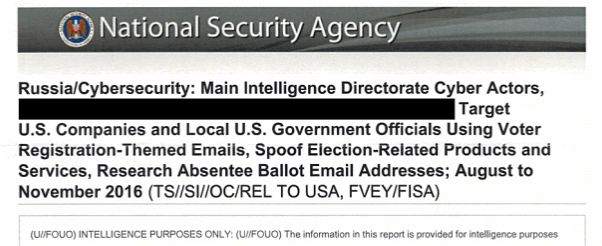Note: In 2021, I’m writing a new blog post every weekend or so. This is entry 46 of 52.

You probably remember the name Reality Winner and at least some of her story: in May 2017, when Trump fired then-FBI director James Comey for his investigation into the Putin regime’s interference with the presidential election on behalf of a certain cheeto-colored demagogue, a whistleblower in her twenties leaked a classified document detailing how the Russian military hacked US election systems just days before the November 2016 election. I reported in person from her August 2018 sentencing in Augusta Georgia, where, in the Trump administration’s first espionage case against a domestic whistleblower, Reality Winner was given the longest prison term ever for a disclosure to the media.
This week, news in the United States — whether social, corporate, or other — will likely focus on Reality Winner again since the Bureau of Prisons on Tuesday is changing her status from her current home confinement situation (began June 9) to three years of supervised release, phase similar to the more familiar, state-level term parole, which technically no longer exists on the federal level. Her ankle monitor will finally be removed. Recent and ongoing media of various types continue to focus on her case, especially this week.
As a result of the news, the public may have a lot of questions. This post provides an overview of her case, the leaked document and its implications, as well as the surrounding media discourse, plus definitions of relevant Bureau of Prisons jargon and a menu of actions you can pick from to help Reality Winner gain a pardon, the chief goal her family is calling for help with.
Who’s Reality Winner again? What was that document about?
Reality Winner is an idealistic, intelligent, and altruistic Texan. The two best sources of information about her as a person are probably the 2017 New York Magazine profile titled “The World’s Biggest Terrorist Has a Pikachu Bedspread” and the twitter feeds of her family: her mother Billie J. Winner-Davis, her sister Brittany Winner, and her (step)father Gary Davis. If you’re interested, follow those accounts, or at least know how to search their tweets. A good rule of thumb for whistleblower cases: get your information not from the social-climbers and co-opters, but from their families, loved ones, and lawyers like Reality Winner’s attorney Alison Grinter. (The whistleblowers themselves are usually under gag orders.)

Winner is also an Air Force veteran who, at the time she snailmailed the restricted document to The Intercept, was working for Virginia-based spy contractor Pluribus International. You might know the US spy agencies — rebranded intelligence agencies especially following 1970s revelations of scandals such as Operation Mockingbird — are mostly staffed by contractors, whose trade secrets and other private properties are exempt from public oversight due to the laws of biz. In other words, the so-called intelligence community, its structure if not particular individuals within, is motivated not by public safety, but by profit and worse. For Pluribus International, the multilingual Winner translated into English surveilled terrorist communications from languages such as Farsi and Pashto. As Trump was firing Comey, a secret network board system, akin to a classified version of Reddit and accessible by Pluribus International staff, ranked a certain document highly, indicating wide interest in it.
The document, and The Intercept article about it, describes cyberattacks, carried out just days before the 2016 elections, by Russian military hackers against more than 100 local election officials in the United States and at least one U.S. supplier of software used to manage voter rolls in multiple counties. In short, Winner gave everyone information required for self-governance, gave everyone necessary knowledge otherwise unavailable. That includes any voting vendor staff who, without security clearances, would not have been able to access such protective classified information unless it appeared in open discourse. Computer security expert Bruce Schneier, a fellow at Harvard Law School’s Berkman Center for Internet & Society, wrote in a June 9, 2017 post on his personal website that the cyberattacks disclosed by Reality Winner “illustrate the real threats and vulnerabilities facing our elections, and they point to solutions.”
Such computer vulnerabilities ultimately show how state, corporate, or other criminal actors (or combinations thereof), anywhere in the world, can manipulate elections, anywhere in the world, to secretly condition the public into believing lies. As philosopher and former Wikileaks Central editor Heather Marsh explains in my article from Winner’s sentencing:
“This document is more than just evidence of Russian interference. In many ways, the US election is a high-profile, long-term investigation into the nature of how democracies work today. Opinions are manipulated by organizations such as Cambridge Analytica in conjunction with intelligence collection by organizations such as Wikistrat. These are problems which have plagued all democracies for years now–Canada’s 2011 voter suppression robocalls and Andrés Sepúlveda’s decade-long manipulation of Latin American elections are two earlier reported examples of modern election interference.”
Marsh’s quotation continues in my article from her sentencing. The public’s understanding of TrumPutin wouldn’t have developed to the extent it did, had Winner not gifted us (and Congress) with the secret document.
In that same article of mine, long-time elections integrity activist Bev Harris explains the cyberattacks described Winner’s in disclosure are part of the same cyberattacks that make up the last count in then-special counsel Robert Mueller’s ’12 Russians’ indictment against the Putin regime’s military hackers. The top prosecutorial agency in the United States issuing an international criminal indictment drawing in part from the deed of this imprisoned whistleblower, an individual in her mid-twenties wrongly called by that same agency’s lawyer Bobby L. Christine “the quintessential example of an insider threat,” suggests, as do many other things, that Winner deserved a medal, not a prison sentence, and at the very least deserves a pardon now.
Sinners in the hands of an angry audience

FOX News ran a paint-by-numbers campaign tarring Winner, the arguments of which are easy to dismantle. The TV hosts, typically on whatever forms of speed — just hit pause and look at their eyes; also, how do you think they manage to broadcast nonstop? — raged about how on social media, Winner called Trump an “orange fascist” and messaged her sister about hating America. Besides considering Trump’s actual fascism and horrible things done by the United States (for instance, by the CIA), just imagine for an analogy that you’re waiting at Discount Tire for the mechanics to finish with your car. In the morning, a caffeine-deprived mechanic in the back employee area, perhaps a decorated veteran like Winner, grouses to another mechanic about hating Discount Tire’s early start times and lack of vegan food in the break room. As afternoon arrives, the same mechanic and a third mechanic talk together about how the company does offer them good things too, including the opportunity to tinker with a steady stream of various automobiles. By evening, the mechanic says they have mixed feelings about Discount Tire and the company should make some improvements. That’s essentially what the comments of Winner and everyone else venting about politics on social media boil down to. It isn’t difficult for those outside tunnel vision to understand.
Meanwhile, on the mainstream US left, comfy members of the public have seemingly decided that nothing is possible except voting for evil on un-auditable computerized election infrastructure while making fun of whistleblowers’ unusual names. If horrific human rights violations happen every day and humanity goes extinct, well, the thinking seems to go, at least they got a few more moments to [insert distractions here]. Expecting lifelong entertainment, these audiences will get angry when instead they’re presented with education.
The duopoly stereotypes above are fortunately dissolving faster and faster as the public, especially younger generations, communicate interpersonally more and more, thanks to the Internet. However, the propaganda battles online continue, as does increasing authoritarian control of the online world.
Bottom line, fight for justice: don’t be a newb whose biggest ‘contribution’ this week is shitposting lazy remarks about Reality Winner’s excellent aptronym; instead, learn more about her case (below) and select a way to help her get a pardon (also below).
Recent or ongoing media offering more about the whistleblower and/or the document she disclosed

Reality Winner is the subject of Is This A Room, a new Broadway stageplay based on the transcript of her FBI interrogation, during which she was not Mirandized: she was not read her rights, not for remaining silent, not for a lawyer’s presence. This (il)legal sleight of hand was pulled off in the courtroom by the prosecutors denying the context and insisting Winner “would have felt free to terminate the encounter.” But the eleven FBI agents, each male and almost all of them armed, pressured her in many ways, tantamount to coercion, including by bullying her into the titular seven-by-nine-foot unfurnished back room she told them was “creepy” and “weird.” With her cramped into the claustrophobic space, they blocked the doors and proceeded with the supposedly voluntary interrogation. According to reviews, the stageplay — I’ve yet to see it — reunites the transcript and the context, helping to alter our crazymaking world into something new that actually drives people sane.
(Such isolation and control as the FBI agents’ is similarly employed elsewhere in our lives to produce bogus psuedo-realities. To take one example out of zillions, consider an antidepressant trial started when the COVID-19 pandemic started. How’s the confound of a terrifying pandemic removed from the analysis of the psychopharmaceutical’s efficacy? Likewise, the context of study participants being paid and promised better lives, is likewise snipped out by contractor scientists who sometimes even hold conflict-of-interest patents on the pills in question, since unlike salaried scientists, contractor scientists, akin to those contractors staffing spy agenices, are exempt from disclosure requirements, that is, transparency and accountability requirements.)
Is This A Room, 70 minutes with no intermission, runs at the Lyceum Theatre through November 27. Official website; buy tickets. The stageplay has received critical acclaim and sudden popularity.
Given the success of the stageplay, the Broadway Podcast Network recently launched a series entitled This Is Reality. With more on the way, they presently offer four full episodes, released between October 18 and November 17. I recommend listening for great, up-to-date information about Reality Winner, her case, and more, including how the 1917 Espionage Act, more than a century old, is used federally not to prosecute individuals for sharing military movements with foreign enemies, but to prosecute domestic whistleblowers for sharing restricted knowledge with the public (usually via the media), i.e. the enemy of authoritarians is the public, you and me.
The DC-based Dworkin Report, hosted by politico Scott Dworkin, cofounder of The Democratic Coalition political action committee, offers a trio of recent interviews. First, from August 4, an interview with Winner’s lawyer, Dallas-based Alison Grinter. Second, from October 5, an interview with the whistleblower’s sister, Brittany Winner. Third, from October 7, an interview with Billie J. Winner-Davis, Reality Winner’s mother who on social media fiercely advocates for her family every single day. Those Dworkin Report links have been going down sometimes, so if they’re temporarily unavailable, try elsewhere: first interview, second interview, third interview. Make sure you listen to Scott Dworkin’s interview of Billie J. Winner-Davis, the whistleblower’s mother. I’ll note two things about it. First, she calls upon Biden to grant her daughter clemency (a pardon is a form of clemency). Second, about Glenn Greenwald. After I spearheaded a successful effort to drag him in 2014 long before it became popular to do so (see here, here, here, here, and elsewhere), I switched to just ignoring Greenbacks, since that’s often the most effective way to turn someone’s volume down. However, Billie J. Winner-Davis says something in the third interview that I think is worth making an exception for, worth amplifying. Reality Winner was burned (arrested) as a source for The Intercept because (as the official story goes, anyhow), journalists there not only talked with government officials trying to confirm the document’s veracity (which is fine), but also sent them the document itself (which isn’t fine), enabling them to track the whistleblower down from various clues associated with the document. Asked about that, Billie J. Winner-Davis told Scott Dworkin:
“Glenn Greenwald is, I mean, he’s hard to figure out; he likes to use Reality to create, you know, a social media storm. But that’s what he’s doing: he’s using her. I wish he would just stop. You know, I have gotten so much support from people from The Intercept and from First Look Media who have reached out to me personally who have expressed the regret about what happened to Reality and who have expressed their support for her and for our family. Glenn Greenwald is not one of those people, and I just wish he would go away.”
I predict that during this new decade, revelations will arrive of popular US-based or US-ish lefty journalists being on the take (receiving illicit money from) the BRICS regimes such as Putin’s. Occasionally I look at job openings at tiny “radical news” outlets and see the high pay and think, yeah, this doesn’t add up. As Spock might say, simple logic. An important byproduct of Winner’s leak has been the reactions of others, exposing who cares about inflating themselves as Great Men while supporting red-brown alliance (red commies cliquing up with brown fascists as oft black-clad anarchists go on as DIY as ever) and BRICS interests (here’s looking at you, clan Assadnge), versus who cares about human rights, including for whistleblowers who are women (and thus too often downplayed or ignored), as well as open democracy over authoritarianism.
Another source of information: documentary filmmaker Sonia Kennebeck’s 93-minute movie United States vs. Reality Winner that premiered earlier this year.
Finally, my August 2018 article from her sentencing is the only detailed narrative from the courtroom, and one of the very few written detailed analyses, besides the original Intercept article, of the leaked document. I’ve also written posts about her case here, which you can find via clicking my blog’s Reality Winner tag. I have some additional unpublished investigative material I plan to pull together for release soon.

Frequently asked vocabulary
Like any bureaucracy, the carceral industry and the Bureau of Prisons in particular have their own specialized, intentionally impenetrable jargon. Since these terms will be thrown around this workweek — and in the future regarding other federal whistleblower cases — here’s a quick glossary explaining what the lingo actually means on the federal level and how it pertains to Reality Winner.
Note: To follow the below, it helps to understand the timeline of Winner’s imprisonment: after sentencing, she was moved to incarceration at FCC Carswell in Fort Worth. Then on good time earned, she was moved a little early to incarceration in person at a halfway house. Next, on June 9, she moved to home confinement, still considered incarceration, involving conditions such as a buzzing electronic ankle monitor, and requiring frequent reporting to the halfway house for drug testing and the like. Then Tuesday she’s no longer incarcerated, but on three years of supervised release, basically the federal equivalent of parole.
Now the definitions. On Monday I asked Winner’s lawyer Alison Grinter about these terms, but any mistakes are mine.
Supervised release) A period of time after incarceration that’s supposed to help prisoners re-integrate back into society. Sort of a midpoint between full Bureau of Prisons custody and living out in the free world. It’s close to the more familiar, state-level concept of parole, which no longer exists on the federal level. If a prisoner on supervised release is held to have violated conditions, the Bureau of Prisons can yank them back behind bars for the remainder of the sentence.
Halfway house) To be exact, halfway house is an umbrella term that encompasses a few different types of facilities. Generally, though, and in Reality Winner’s case, a halfway house means what the Bureau of Prisons calls a Residential Reentry Center (RRC), unsurprisingly run by a private contractor. Typically, federal prisoners go to these halfway houses directly after incarceration and physically stay there. Later, during home confinement, the prisoners frequently report to the halfway houses, which set the conditions of their home confinement period.
Home confinement) Still considered incarceration, home confinements see prisoners living at home with a heavy electronic ankle monitor. They’re expected to obey strict conditions and report to the halfway house periodically.
Clemency) Formally speaking, clemency isn’t a federal concept. Informally, though, it refers to the remedies an executive can give prisoners, among them commutations and pardons. Reality Winner asks for clemency, specifically (and more precisely) a pardon.
Commutation) A commutation is a federal remedy that essentially speeds up a prisoner’s sentence. A commuted sentence is stopped early; prisoners’ sentences are over sooner than they would have been otherwise. But with the behind bars, halfway house, and home confinement phases over on Tuesday, Reality Winner is no longer seeking a commutation; instead, she’s seeking a pardon.
Pardon) A convict receiving a federal pardon is no longer a felon; in the eyes of the law at least, they’re fully and completely forgiven. Yet there’s no federal expungement: the pardoned individual’s case still happened. The point of the pardon is that legally, any and all the felony conviction disabilities, as the adverse consequences are called, are removed. That said, what specific employers or apps choose to do regarding a pardoned former felon, may be up to them.
Expungement) This isn’t available at the federal level. Expungement is a state-level remedy. For example in Texas, an expungement (“expunction” in the Texas statutes) means files about a crime are destroyed and the offense is removed from the person’s criminal record.
Parole) A state-level concept. Parole technically no longer exists at the federal level; it’s been replaced by the concept of supervised release. For general audiences, though, it’s fair enough to imprecisely refer to someone’s supervised release as parole, but for the more exact among us, supervised release is correct.
Probation) This doesn’t relate to Reality Winner’s case. Probation is something imposed in place of incarceration. For example, at a sentencing, a federal judge might impose two months of probation on a defendant as opposed to two years in prison.
Office of Probation and Pretrial Service) Also known as the U.S. Probation and Pretrial Services System, this is the bureau in the judicial branch that not only administers probation, but also administers supervised release.
Probation officer or supervised release officer) Employed by the Office of Probation and Pretrial Service, this person is the one making the day-to-day decisions about a felon’s supervised released conditions. Technically, they’re called a supervised release officer. They might refer to themself as a probation officer, given their employer. That may even be true of Reality Winner’s officer, despite her being on supervised release, not probation.
Those are the vocabulary terms for how the federal carceral system is supposed to work, although as a May 2017 article I wrote for The Cryptosphere shows, things may play out differently in practice, suggesting a strange mix of incompetence and/or decision-makers who aren’t on the up and up, to say the least.
#PardonRealityWinner
It’s important to recognize that even on supervised release and afterward, Reality Winner, though outside prison walls, isn’t free. Her felony record and plea agreement will continue to prevent her from fully speaking out about her case and the leaked document and its implications. On Monday, I asked Winner’s lawyer Alison Grinter about that adverse consequence of her conviction and the additional adverse consequences I describe in the two paragraphs below, but again, any mistakes are mine.

While Winner’s on supervised release for three years, she must obey strict conditions, which may vary according to her supervised release officer’s interpretations or caprices. To legally dispute the officer requires expensive, time-consuming, and stressful requests to the court in Augusta Georgia. Winner on supervised release has a curfew (can’t leave before 6 a.m. and has to be home by 10 p.m.) and must remain physically within the Southern District of Texas, though it’s the Augusta Georgia court that convicted her that ultimately calls the shots. The officer may choose to continue the surveillance of her smartphone. References in interviews to dating apps blocking her as a user revolve not around the supervised release conditions, but rather those apps querying databases and determining she’s a felon and thus barred from swiping.
Without a pardon, Winner will suffer what lawyers refer to as the disabilities of being a felon. For example, she’s banned from certain federal lands (the specifics are complicated). She’s not eligible for various federal benefits such as housing. She can’t own weapons (not uncommon in rural Texas), nor, in a strange provision, may she own body armor. Certain other countries may forbid entry or permanent residency to a U.S. felon. The list goes on.
A pardon would delete all of the above problems and restore Reality Winner’s freedom. It would allow her to share the full story. Like the full story, a pardon would also send an enormous domestic and international signal that the United States does not endorse TrumPutin-style autocracy. In other words, in the interest of open democracy, the United States Government has the need and ability to pardon Reality Winner not just for her, but also for itself and the public. Obama commuted the sentence of, but did not pardon, whistleblower Chelsea Manning; that suggests a pardon for Reality Winner can indeed happen under the Biden administration, but it will take significant effort.
Here are several ways to make #PardonRealityWinner happen:
- Correspond with the US Pardon Attorney by phone +1 202 616 6070, by email USPardon.Attorney@usdoj.gov, and/or by snailmail: U.S. Department of Justice / Office of the Pardon Attorney / 950 Pennsylvania Avenue – RFK Main Justice Building / Washington, DC 20530. It would be very helpful for them to be deluged with international messages explaining how a pardon for Reality Winner would improve the international standing of the United States after the Trump administration convicted her for keeping the investigation into Russian interference alive.
- Share articles and posts about pardoning Reality Winner, including in places other than your most familiar/comfortable social media sites. For example, during offline conversations, on social media sites you aren’t yet familiar with, via art such as graffiti or music, and so on.
- If you know more than one language, translate and share articles and posts about pardoning Reality Winner.
- Politely badger elected officials about Reality Winner, always pushing for the goal: pardoning her. Schedule appointments, call, donate a small amount to get them to actually reply (hey if corporate interests can bribe so can constituents). I’ve talked about Reality Winner with Kamala Harris at one of her campaign stops; I’ve talked to federal staffers, etc. If you haven’t done similar already in your life, you should, even just for the interesting experience.
- Anything else you can dream up. Don’t listen to the naysayers boasting of their cynicism to promise themselves it was wise to have given up in life. Beautiful Trouble is a handy resource book / toolkit for learning nonviolent tactics.
- Sign the online petition, but don’t let that stop you from doing any or all of the above.



This blog post, #PardonRealityWinner: Whistleblower moves to three years of supervised release on November 23, 2021, by Douglas Lucas, is licensed under a Creative Commons Attribution-NonCommercial-ShareAlike 4.0 International License (human-readable summary of license). The license is based on the work at this URL: https://douglaslucas.com/blog/2021/11/22/realitywinner-whistleblower-supervised-release-pardon/. You can view the full license (the legal code aka the legalese) here. For learning more about Creative Commons, I suggest reading this article and the Creative Commons Frequently Asked Questions. Seeking permissions beyond the scope of this license, or want to correspond with me about this post one on one? Email me: dal@riseup.net.
 Twitter:
Twitter:
1 comment so far ↓
“…a pardon would … send an enormous domestic and international signal that the United States does not endorse TrumPutin-style autocracy. In other words, in the interest of open democracy, the United States Government has the need and ability to pardon Reality Winner not just for her, but also for itself and the public.”
I certainly agree with the above statement! But I wonder if you suppose the reverse to be true as well–in other words, if the US does NOT pardon Reality Winner, are they sending the signal that they DO endorse Trump/Putin-style autocracy? (You know, I bring it up because sometimes I get the feel that Biden et al. are perfectly happy with a Trump/Putin-style of government, as long as they can keep their positions AND use Trump/Putin as scapegoats and distractions for their own [the dems’] lack of will to represent popular interests through policy.) But I guess the idea is that the current democratic government could potentially in theory be pressured into issuing a pardon as long as there’s a big enough public pressure campaign, whereas a republican government would almost certainly reject the idea on principle, regardless of public pressure levels.
As far as the Assange case… well, you mention it in passing, but because this post is about Reality Winner, perhaps it’s better not to distract from the post’s important call to action by getting involved with all the salient comparing and contrasting…
Well, so anyway, here’s to putting on the peaceful public pressure and a happy Thanksgiving! (Thanks too for mentioning the play “Is This A Room” by the way–I’m definitely going to check that out!)
Leave a Comment